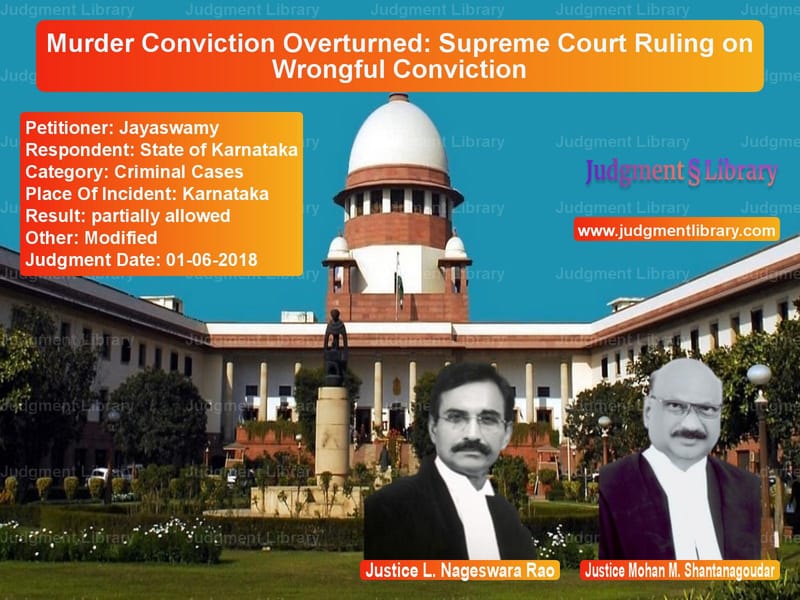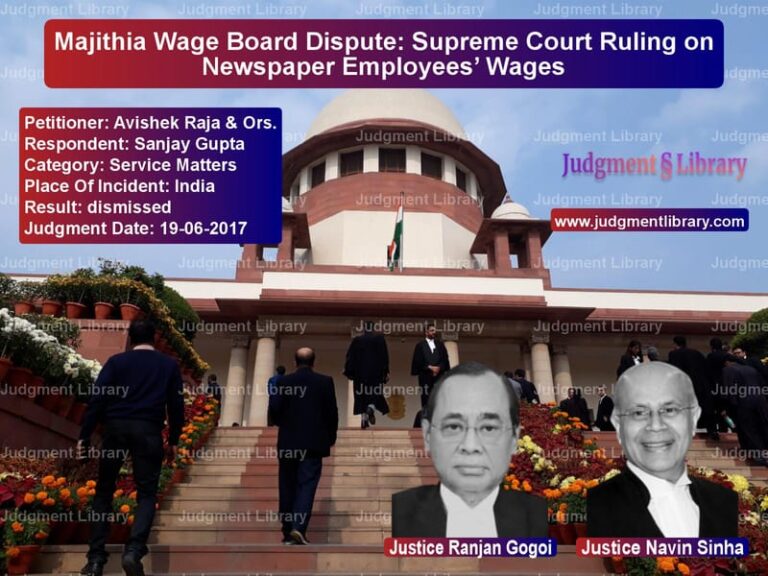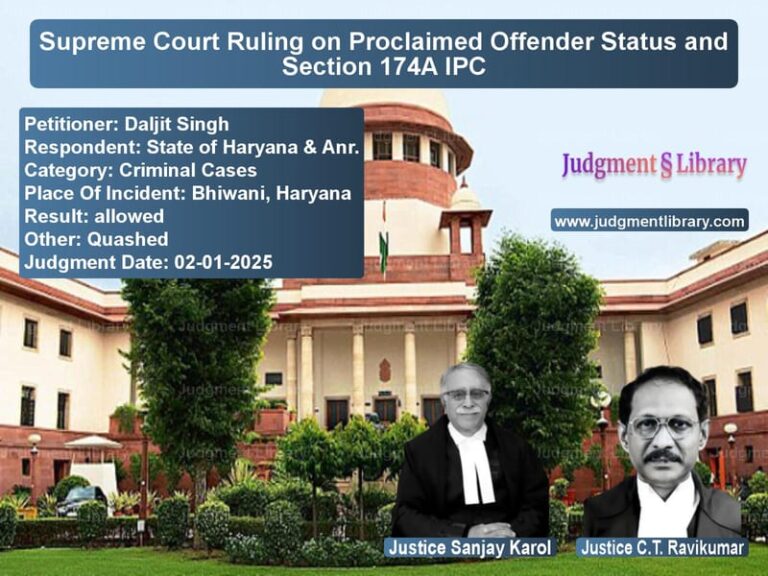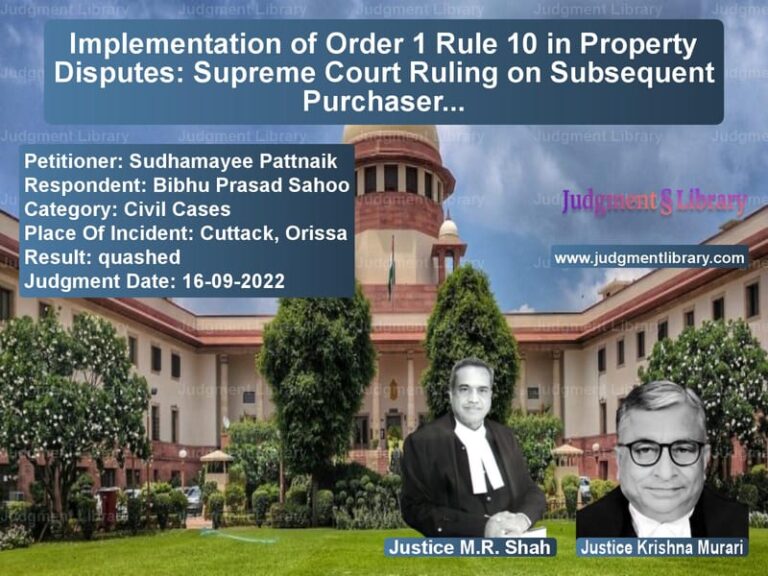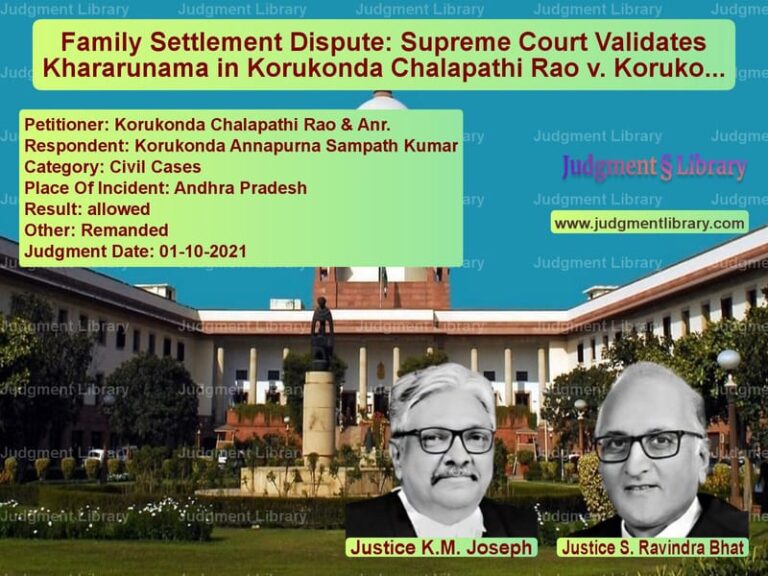Murder Conviction Overturned: Supreme Court Ruling on Wrongful Conviction
The Supreme Court of India, in the case of Jayaswamy vs. State of Karnataka, reviewed the conviction of the appellant for murder (Section 302 IPC) and grievous hurt (Section 326 IPC). The High Court had overturned the Trial Court’s acquittal, convicting the appellant of murder, while confirming the acquittal of four co-accused. The Supreme Court examined the evidence and held that the High Court was unjustified in convicting the appellant under Section 302 IPC.
Background of the Case
The case dates back to 15 January 1994, when a violent incident occurred inside the house of the informant, Smt. Honnamma, in Karnataka. The prosecution alleged that the accused, including the appellant, trespassed into her house and assaulted three individuals:
- Kumari Radhika (11 years old): Attacked with a chopper on the head.
- Smt. Manjula: Sustained multiple head injuries.
- Smt. Honnamma: Suffered grievous injuries from a chopper attack.
Both Kumari Radhika and Smt. Manjula succumbed to their injuries. The case was registered under Sections 302, 326, and 114 read with Section 34 of the IPC.
Trial Court Verdict
The Trial Court acquitted all the accused, ruling that:
- The evidence against the accused was insufficient.
- There was no clear proof of common intention to commit murder.
- The prosecution failed to establish guilt beyond a reasonable doubt.
High Court’s Reversal
The Karnataka High Court reversed the acquittal for Jayaswamy (Accused No.1) and convicted him for murder under Section 302 IPC. However, it upheld the acquittal of Accused Nos. 2 to 5.
Arguments by the Appellant
The appellant, through counsel, argued:
- The High Court erroneously reversed a well-reasoned acquittal.
- There was no direct evidence linking him to the murder of the two victims.
- The only credible witness, Smt. Honnamma, confirmed that the appellant assaulted her but not the deceased.
- The High Court failed to provide substantial reasons for convicting the appellant while acquitting others.
Arguments by the Respondent
The prosecution argued:
- The appellant played an active role in the attack.
- The appellant’s presence and involvement in the crime demonstrated common intention.
- The Trial Court had erred in acquitting all accused despite strong evidence.
Supreme Court’s Observations
The Supreme Court carefully examined the evidence and found crucial inconsistencies in the High Court’s ruling. Key observations included:
- “The first appellate court should not have interfered with the judgment of acquittal, particularly when the findings were based on settled principles of law and appreciation of evidence.”
- “No substantial and compelling reasons exist to reverse the acquittal of the appellant when the other co-accused were acquitted.”
- “The evidence by the prosecution witness (Smt. Honnamma) does not implicate the appellant in the murder of the deceased.”
- “There is no material evidence to prove that the appellant had a common intention to kill the victims.”
Final Judgment
The Supreme Court partially allowed the appeal and held:
- The conviction of the appellant under Section 302 IPC was overturned, and he was acquitted of murder charges.
- The conviction under Section 326 IPC (grievous hurt) was upheld, as the evidence showed he attacked the informant.
- A sentence of 7 years imprisonment and a fine of Rs. 10,000 was confirmed for the grievous hurt charge.
- The appellant had already served 11 years in jail, so he was ordered to be released immediately.
Impact of the Judgment
This ruling reinforces critical legal principles:
- The presumption of innocence strengthens after an acquittal.
- High Courts should not overturn acquittals unless there are substantial and compelling reasons.
- Convictions should not be based on weak circumstantial evidence.
- Acquitting some co-accused while convicting one requires strong justification, which was lacking in this case.
By acquitting Jayaswamy of murder, the Supreme Court ensured that wrongful convictions do not stand, emphasizing the importance of evidence-based justice.
Petitioner Name: Jayaswamy.Respondent Name: State of Karnataka.Judgment By: Justice L. Nageswara Rao, Justice Mohan M. Shantanagoudar.Place Of Incident: Karnataka.Judgment Date: 01-06-2018.
Don’t miss out on the full details! Download the complete judgment in PDF format below and gain valuable insights instantly!
Download Judgment: Jayaswamy vs State of Karnataka Supreme Court of India Judgment Dated 01-06-2018.pdf
Direct Downlaod Judgment: Direct downlaod this Judgment
See all petitions in Murder Cases
See all petitions in Bail and Anticipatory Bail
See all petitions in Attempt to Murder Cases
See all petitions in Judgment by L. Nageswara Rao
See all petitions in Judgment by Mohan M. Shantanagoudar
See all petitions in partially allowed
See all petitions in Modified
See all petitions in supreme court of India judgments June 2018
See all petitions in 2018 judgments
See all posts in Criminal Cases Category
See all allowed petitions in Criminal Cases Category
See all Dismissed petitions in Criminal Cases Category
See all partially allowed petitions in Criminal Cases Category

